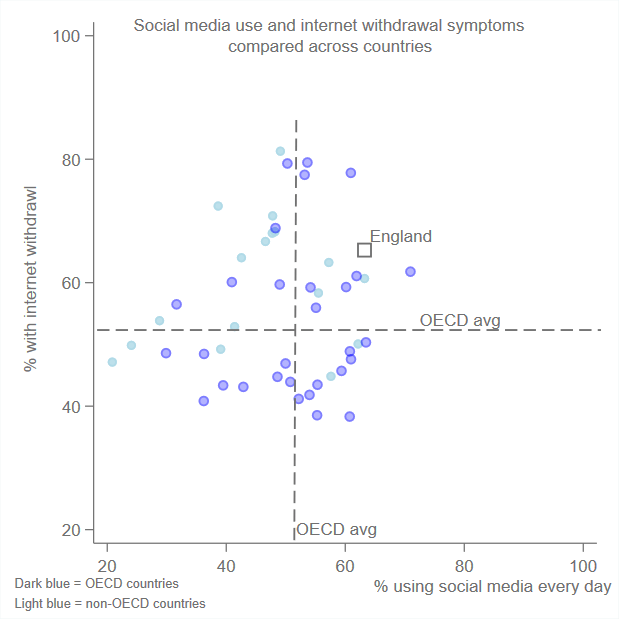PISA: are teenagers in England addicted to social media (And does it matter)?
By Blog Editor, IOE Digital, on 17 September 2019
There have been lots of concerns raised recently about social media use among young people. This includes links found between time spent on social media and declines in mental health. Similarly, some are now likening constant internet use to an addiction, with teenagers suffering withdrawal symptoms if their smartphone is taken away.
But how frequently do young people in England access social media? Are they any more or less ‘addicted’ to the internet than young people in other countries? And does this supposed addiction to the internet really do their mental health any harm?
Evidence from the latest PISA data available may well hold some clues.
Social media use and internet ‘addiction’ as measured by PISA
In PISA 2015, 15-year-olds from more than 40 countries including England completed a questionnaire about their use of technology.
This included a question on the frequency with which they used social networks on a five-point scale (from almost never through to every day). They were also asked the following question about whether they suffered withdrawal-like symptoms if they were not able to connect to the internet:
‘I really feel bad if no internet connection is possible’. (Strongly disagree to strongly agree).
The chart below compares responses to these two questions from teenagers in England to those of teenagers in other countries.

England is in the top-right quadrant – illustrating that it is above the OECD average on both measures. That is, young people in England are more likely to use social media every day and more likely to express withdrawal symptoms if internet access is taken away than young people in most other countries across the world.
The important question
But does this matter?
The table below illustrates a correlation between daily social media use and internet ‘addiction’.

In total, 71% of daily social media users in England experienced internet withdrawal symptoms. This compares to 53% of teenagers who use social media less frequently. A similar difference held after differences in the gender, socio-economic status, academic achievement and school attended of social media users were taken into account.
Teenagers who experience the strongest withdrawal symptoms also reported the lowest life satisfaction scores on a scale of 0 to 10, as the next table shows.

In particular, the average life satisfaction score for teenagers who strongly agreed that they felt bad when no internet was available was 6.8 out of 10. This is half a point lower than for teenagers who did not report suffering internet withdrawal symptoms, who had an average life satisfaction score of 7.31 out of 10.
In other words, daily social media use among teenagers in England is linked to symptoms of internet withdrawal. This, in turn, is associated with lower levels of life satisfaction. Of course, these relationships are correlational rather than causal. They nevertheless highlight how important it is that we develop a better understanding of the impact that social media has upon teenagers’ lives.
10 Responses to “PISA: are teenagers in England addicted to social media (And does it matter)?”
- 1
-
2
If London were a country, how would it do in PISA? | IOE LONDON BLOG wrote on 8 October 2019:
[…] posts in this series can be found here, here and […]
-
3
How do headteachers in England use test data, and does this differ from other countries? | IOE LONDON BLOG wrote on 15 October 2019:
[…] Other posts in this series can be found here, here, here and here. […]
-
4
Are all types of reading equal, or are some more equal than others? | IOE LONDON BLOG wrote on 22 October 2019:
[…] Other posts in this series can be found here, here, here, here and here. […]
-
5
How do GCSE grades relate to PISA scores? | IOE LONDON BLOG wrote on 29 October 2019:
[…] Other posts in this series can be found here, here, here, here, here and here. […]
-
6
Is PISA ‘fundamentally flawed’ because of the scaling methodology used? | IOE LONDON BLOG wrote on 5 November 2019:
[…] Other posts in this series can be found here, here, here, here, here, here and here. […]
-
7
Should we eat more fish or more ice-cream to boost PISA scores? | IOE LONDON BLOG wrote on 12 November 2019:
[…] Other posts in this series can be found here, here, here, here, here, here, here and here. […]
-
8
Is Canada really an education ‘superpower’? The evidence is not as clear-cut as you might think | IOE LONDON BLOG wrote on 19 November 2019:
[…] Other posts in this series can be found here, here, here, here, here, here, here, here and here. […]
-
9
Should England continue participating in PISA? | IOE LONDON BLOG wrote on 26 November 2019:
[…] Other posts in this series can be found here, here, here, here, here, here, here, here, here and here. […]
-
10
Five things to remember when the PISA 2018 results are released | IOE LONDON BLOG wrote on 2 December 2019:
[…] Other posts in this series can be found here, here, here, here, here, here, here, here, here, here and here. […]
 Close
Close




[…] Other posts in this series can be found here and here. […]